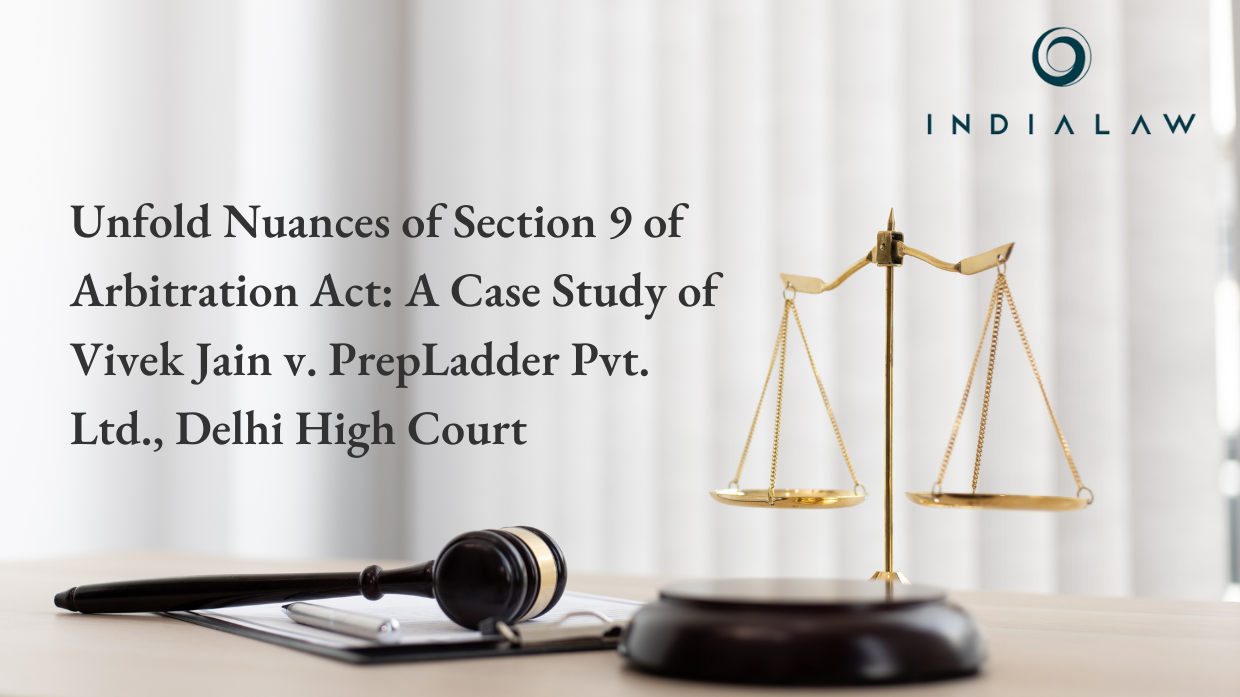Unfold Nuances of Section 9 of Arbitration Act: A Case Study of Vivek Jain v. PrepLadder Pvt. Ltd., Delhi High Court

It was interpreted by the Delhi High Court that the Court exercising its powers under Section 9 of the Arbitration and Conciliation Act, 1996(‘Arbitration Act’) to secure the amount in dispute or to order attachment before Award, the Court draws power from the principles of Order XXXVIII Rule 5 of the Code of Civil Procedure, 1908 (‘CPC’).
The Single Judge of the High Court, Justice Yashvant Varma held that Section 9 of the Arbitration Act, the Court would not order securing the sum in dispute in absence of appropriate pleading and allegations that there is an attempt by the Respondent to defeat any Award that may be passed in favour of the Petitioner. That no such relief can be granted by the Court unless the pre-conditions for grant of such a relief under Order XXXVIII of CPC are satisfied by the Petitioner.
Vivek Jain v. PrepLadder Pvt. Ltd.i Analysis
In this case we go through the complexities of Section 9 of the Arbitration Act, revealing the equilibrium between protection and restraint guiding the Indian legal system in the realm of arbitration.
Facts of the case
A License Agreement (hereinafter referred to as Agreement) was signed between the Petitioner (Vivek Jain) and the Respondent (Prepladder) on August 3, 2020. As per the said agreement, the petitioner was to develop educational content and videos that would be posted on the Respondent’s website (Prepladder).
The dispute between the Plaintiff and the Respondent arose in May 2022 when the Petitioner refused to extend the Agreement resulting to a change in the payment structure which shifted to a revenue sharing model as opposed to the fixed fee. During this period, the petitioner along with other educators, started “Cerebellum Academy”, that was an offline educational platform launched for students who were preparing for Post Graduate Medical Entrance Examinations.
Further in October 2022, the Respondent denied the Petitioner, the Special Retention Bonus that caused further issues between them and their relationships got affected.
Additional disputes cropped up between the parties when the Respondent asked the petitioner to modify the content as per the Statement of Work (SoW) agreed between them, however, the Petitioner asserted that he had complied with the SoW while developing the content and there is no need for any revision.
In November 2022, an e–mail was sent by the Respondent alleging that the Petitioner had committed breach of the Agreement as he has started a similar educational platform as that of the Respondent. The contention of the Petitioner was that “Cerebellum Academy” was an offline mode and hence the same was not in breach of the Agreement.
The Respondent stated that there is a willful and intentional breach of Agreement on part of the Petitioner. That several social media posts were posted by the Petitioner promoting “Cerebellum Academy” that stands in direct competition with PrepLadder.
On 26th November 2022, a cease-and-desist notice was issued by the Respondent to the Petitioner. In December 2022, the Petitioner filed the petition under Section 9. On 16th February 2023, the Respondent terminated the Agreement the High Court appointed the arbitrator on an application filed u/s 11 of the Arbitration Act.
Issue Involved
- Whether the Court while exercising its power under Section 9 of the Arbitration Act to secure the amount in dispute will be guided by the principles mentioned in Order XXXVIII Rule 5 of the CPC?
Contention of the Parties
Arguments of the Petitioner
- The Petitioner is liable to the license fee and hence, the Court must pass directions to the Respondent to deposit the same.
- The “Cerebellum Academy” which was started by the Petitioner will commence commercial operation after the tenure of the Agreement had come to an end.
- The Respondent has been using the content for monetary benefits that was developed by the Petitioner and hence, it would not be just to deny license fee.
- Seeking a mandatory injunction against the respondent to directing it to disburse license fee.
Counterarguments of Respondent:
- That the Petitioner cannot claim license fee and the same is under dispute as he has breached the Agreement and has not developed the content as per the SoW.
- Such relief cannot be sought as by the Petitioner as he has failed to satisfy the pre-conditions for the grant of such relief.
- For seeking relief of attachment before judgment or to secure the amount, the Petitioner must show that the final award if delivered in its favour would not be successfully complied due to disposal of assets.
- The prayer seeking mandatory injunction directing the respondent to pay the disputed amount is beyond the ambit of Section 9 of the Arbitration Act.
Court analysis and observation
It was observed by the High Court that the amount claimed by the Petitioner is not undisputed rather there is a serious dispute between the two pertaining to their rights and obligations under the Agreement. The Respondent disputes its liability to pay license fee to the Petitioner on the ground of breach of Agreement and deficiency of work.
It was further analyzed by the Court that the petition does not avow that the Respondent is likely to dispose of the subject matter of the arbitration or it would fail to satisfy the award if passed in favour of the petitioner.
Decision of the Court
It was held by the Court that Section 9 of the Arbitration Act to secure the dispute amount or to pass an order of attachment before award draws sustenance broadly from the principles of Order XXXVIII Rule 5 of CPC. That the Court would not order to secure the disputed amount in absence of necessary pleading and allegations that the Respondent is making an attempt to defeat any Award that may be passed in favour of the Petitioner. It held that the Court would not grant such a relief unless the pre-conditions for grant of relief under Order XXXVIII of CPC are broadly satisfied by the petitioner.
The High Court further noted difference between two recent judgments of the Supreme Court in Essar House v Arcellor Mittal Nipon and Sanghi Industries v. Ravin Cables, both the judgments are based on the principles of CPC pertaining to attachment before judgment u/s 9 of the Arbitration Act.
In the case of Essar, Supreme Court held that it would not withhold relief on the mere technicality of absence of averments or grounds akin to those which must be made when a prayer for attachment before judgment in terms of Order XXXVIII Rule 5 of the Code comes to be made. But in the case of Sanghi Industries the Court held that order to secure disputed amount can be made in absence of satisfaction of conditions laid down under Order XXXVIII Rule 5 of CPC. It must be noted that the decision in the case of Sanghi Industires has come later to the judgment in Essar Homes, and hencethe High Court is bound to follow the judgment passed in Sanghi Industries.
Further, the High Court rejected the claim of relief of payout of disputed amount stating that such a relief is beyond the purview of Section 9 of the Arbitration Act. Securing the amount in dispute and passing any such direction would go beyond the duty of the Court. The Court dismissed the petition by stating that any such direction would entail not only a conclusive and final adjudication on the right of the petitioner to receive such a sum but also perhaps amount to the framing of an interim Award itself.
By entering the email address you agree to our Privacy Policy.



